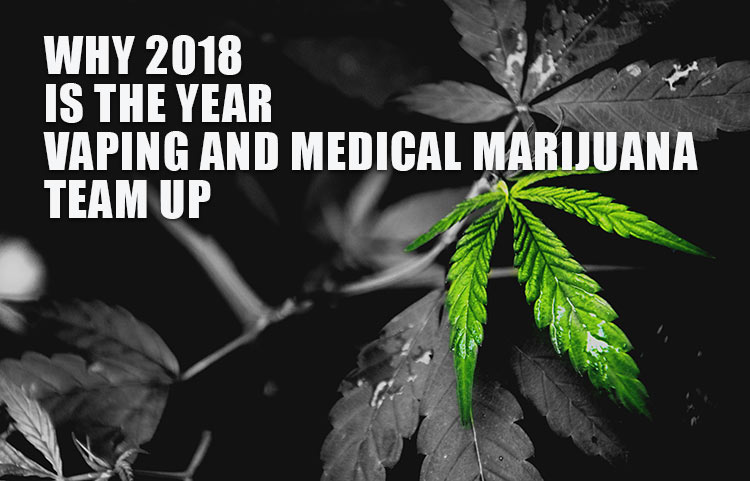Table of Contents
After years of skepticism, both vaping and medical marijuana usage are becoming increasingly accepted by the public. Vaping sales have continued to rise in recent years as smokers try to steer clear of the far more harmful cigarettes. Meanwhile, cannabis has become legalized for medical uses in almost half of America while new Canadian laws as of 2018 will legalize it for recreation too.
In addition to those individual journeys, though, vaping and medical marijuana have become a joint force in 2018. Whether you use marijuana for medical reasons or recreational enjoyment, here’s why the vape scene is so crucial.

Vaping Marijuana Is Safer Than Smoking It
Whether smoking cigarettes or weed, your lungs are the most vulnerable body part by far. The smoke is linked to cancer, bronchitis and emphysema, but vaping severely reduces the amount of smoke hitting your lungs.
As such, vapers regularly find that they can breathe more freely than when they were smoking the traditional way. Moreover, the fact that vapor is cleaner than standard smoke can have a telling impact too.
This all revolves around the method of burning, as vaping creates an aerosol rather than the traditional combustion. This doesn’t remove all potential dangers, but it does significantly impact the outcome.
Vaping Weed Is Safer Than Vaping Marijuana Oil
Butane Hash Oil (BHO) has been a popular option for several years. But if you think you know exactly what’s in the bottle, you’re wrong. As with other drugs like cocaine or MDMA, a lack of quality control can potentially put you at great risk. Solvents and other additives are far too common.
While this isn’t a major problem when buying medical marijuana from a licensed retailer, it’s still better to vape medical marijuana as you can be sure of the contents.
The Vape Industry Is Working Alongside Medical Marijuana
Vaping companies continue to produce devices that are built with medical marijuana users in mind. These include 2-in-1 vaporizers that can handle both dry herb and vape juices. So, anyone that vapes for pleasure while also using marijuana for medical reasons can take advantage of those opportunities.
Given that the general quality and safety of those devices has seen a rapid increase too, it’s no wonder so many medicinal weed smokers are turning to vaping solutions.
Vaping Cannabis Produces Quicker Results Than Consumption
There are many ways to get cannabis into your body. Subsequently, there can be varying lengths of time before the pain relief benefits start to show. This is another reason for choosing vaping weed over alternative methods.
Eating marijuana is a very slow process as the stomach takes a long time to absorb the ingredients. This additionally makes it hard to get the dosage right. Vaping utilizes the lungs for a far quicker route to the bloodstream, allowing patients to feel the benefits in seconds.
If nothing else, this allows patients to vape only when pain relief is required. When added to the other benefits, the shift towards vaping seems set to continue for many months to come.
Medical Marijuana and the State of Florida
In order for a person living in the state of Florida to gain access to legal medical marijuana, he or she needs to seek treatment from a qualified physician to see if that patient meets certain eligibility requirements under the law. The qualified physician then must, by law, input the patient’s information and the order for medical marijuana into the Medical Marijuana Use Registry. Then the patient or the patient’s legal representative needs to apply for a compassionate use registry identification card. Once approved, the patient will then be able to contact one of the state licensed medical marijuana treatment centers to fill their medical marijuana prescription, aka, a dispensary. How did this come about?
On November 08, 2016, Ballot Initiative Amendment 2: “Use of Marijuana for Debilitating Medical Conditions” was approved by Florida voters, effectively legalizing the medical use of marijuana by qualified patients. The Amendment passed after winning 71.1% of the votes. Amendment 2 became effective January 3, 2017, granting qualified Florida residents access to medical marijuana.
This amendment had the following stipulations:
- Allows medical use of marijuana for individuals with debilitating medical conditions as determined by a licensed Florida physician.
- Allows caregivers to assist patients with the use of medical marijuana.
- The Department of Health shall register and regulate centers that produce and distribute marijuana for medical purposes and shall issue identification cards to patients and caregivers.
- Applies only to Florida law.
- Does not immunize violations of federal law or any non-medical use, possession or production of medical marijuana.
Under the law, patients diagnosed with cancer, epilepsy, glaucoma, HIV/AIDS, PTSD, ALS, Crohn’s disease, Parkinson’s disease, multiple sclerosis, or who suffer from chronic pain related to any of these diseases are eligible to receive a 70-day supply of cannabis-infused oils or edible products only. On June 24, the law became effective and it includes eliminating the initial 90-day waiting period for the use of medical marijuana and added chronic nonmalignant pain as a qualifying condition.
Interestingly enough, some Florida cities, including Boca Raton, Coral Gables, Delray Beach, the Villages and Homestead, have banned medical marijuana dispensaries since it is illegal under federal law.
The medical marijuana law in the state of Florida is considered by many to be massively confusing, inconsistent, and generally messed up.
A lawsuit against the state health officials was filed in November, 2017 asserting they have been purposely delaying officially launching its comprehensive medical marijuana program. The law instructed Florida health officials to award 10 new medical marijuana licenses by the beginning of October, 2017. However, the Florida Department of Health granted only six such licenses after the law went into effect.
The lawsuit argues that the number of medical marijuana treatment centers (dispensaries) operating across Florida is totally inadequate for a state that is so large in both population and geography. (New Hampshire, by comparison, has four legal dispensaries) The suit continues to say the limited quality and marijuana strain types make the problem worse, making it difficult for patients to even obtain cannabis. The failure to issue the licenses and open the application process violates the constitutional and statutory rights of Florida citizens and businesses and directly affects the ability of patients to treat their ailments, say the lawyers in the lawsuit filed in Leon County circuit court.
Jon Mills, retired dean of the University of Florida law school and a former state House Speaker (1986–88), is the lead counsel on the aforementioned lawsuit. Deputy Solicitor General Denise Harle argues that “the plain language of the Amendment refutes” Morgan’s case. Mills responded to Harle that the amendment itself “places no limitation on the use of marijuana in a form for smoking,” calling the ban a “direct irreconcilable conflict.” Saying that the amendment doesn’t overtly address smoking “misses the point,” he added that banning it “takes discretion out of the hands of patients and physicians.”
Circuit Judge Karen Gievers scheduled a January 25, 2018 hearing on the state’s motion to dismiss. On January 26, 2018, the judge refused to grant the state’s motion to dismiss the case and will allow the case to proceed. And that’s where we stand today. As this is written, it is mid-May 2018, and the state is still dragging its collective feet getting this much needed program completely up and running.
Want to find out how to get approved for a Medical Marijuana ID card in Florida ?
Find out a list of dispensaries in Florida by downloading our Free e-Book.
Author:
Brett Sandman, is the founder of Florida Medical Marijuana. It’s now 6 years since he is in the Medical Marijuana business. He has helped numerous people to find relief through Medical Marijuana. He has previously worked in similar companies in Colorado and California.”





